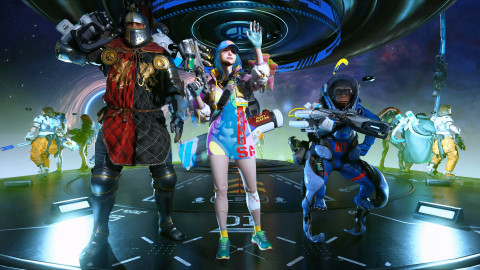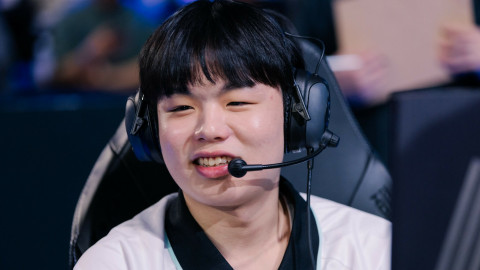Developed by ONEUNIVERSE and serviced by Gala Games, “Champions Arena” was officially released on PC and mobile devices. Champions Arena is a game that adheres to the genre's conventions as a turn-based collectible RPG, familiar to gamers who have enjoyed mobile games. Players can assemble their own teams by combining various characters and items, enjoy campaigns, or compete with other users, offering a wide range of content.
What sets Champions Arena apart as a Web3 game from traditional turn-based collectible RPGs is the introduction of NFTs. This allows players to tokenize characters and items they no longer need and trade them. However, NFTs don't serve as an entry barrier or hinder the game's enjoyment; they're optional, making it easy for players to decide how much emphasis they wish to place on Web3 aspects.
Rather than focusing on P2E or tokenomics, Champions Arena concentrates on the core fun of the game. This article delves into the many facets of 'Champions Arena', showcasing its high level of refinement.
Impressive First Impressions in the World of Web3
Notable graphics and strategic combat system

In any domain, the first impression is crucial. If the first impression is positive, it's easier to engage with anything, be it people or objects, as it reduces initial resistance. The same principle applies to games; even if there are negative aspects, people tend to overlook them when the graphics are appealing.
Discussing visuals is pertinent because, so far, many Web3 games have paid little attention to this aspect. Previous Web3 games had a lower overall quality, including systems, in comparison to conventional games. Since they were primarily designed for mining cryptocurrencies, graphics were not a priority. This led to the assumption that these games represented a new vision in the gaming industry, and user reception was not positive.

When compared to these earlier Web3 games, Champions Arena demonstrates exceptional visual quality. Of course, it's important to note that this assessment is relative to other games within its genre. It's difficult to compare it directly with massive mobile MMORPGs built on Unreal Engine 5 or games with multi-million budgets. However, when compared to the typical turn-based collectible RPG, the game's graphical style may vary depending on individual preferences. Nevertheless, it undeniably meets the visual quality of traditional turn-based collectible RPGs.
While visuals create the first impression, the real enjoyment of the game rests in the combat system. No matter how great the graphics are, if the combat isn't engaging, the game won't last. Therefore, many turn-based collectible RPGs strive to make the combat enjoyable in various ways. Some introduce innovative combat systems, while others adhere to conventional rules but incorporate spectacular animations to stand out.

Champions Arena leans more towards the former. It distinguishes itself by introducing a unique card skill system. These cards, which represent attacks and skills, are central to the game. Cards come in three types: Harmony, Prosperity, and Destruction, with each having different effects depending on the character's role. For example, character A's Prosperity card is an offensive skill, whereas the same card for character B, from a different role, is a Shield skill to protect allies.
It's not only the character roles that influence the card effects; the character's synergy (affinity) with the card can also make these effects more potent. When a Harmony character uses a Harmony card, the skill becomes more powerful due to the attribute match. However, the game doesn't force all characters to use the same synergy card. In a situation with only one enemy remaining, you can disregard attribute synergy and quickly defeat it with a different card.

Furthermore, by allowing card enhancement, Champions Arena adds depth to its strategy. Enhancement is a straightforward process. Placing two cards of the same level and affinity side by side automatically merges them into a stronger card. With some skill, it's even possible to enhance two cards at once. While in the early stages, random combinations might work, in later stages or during PVP battles, players must carefully consider which cards to combine on their turn, thinking strategically about what cards will fill the queue.
In the grand finale of Champions Arena combat, Summoner spells play a crucial role and cannot be overlooked. Players can equip up to three spells that use unique mana resources to enhance their single ally's attack, defense, or weaken the opponent in various ways. Choosing spells and how to match them with characters introduces various strategic considerations.

Of course, these kinds of strategic elements can be considered crucial in ideal combat. However, you don’t need to pay too much attention to the strategy for the campaigns. In any way, if your combat power is high enough, the campaign can be cleared through auto battles. The strategic part comes into play during PVPs. Unless your combat power is significantly higher than your opponent's, it’s crucial to form your team well, think about how you would enhance the cards or which Summoner spells you should use.
Overall, Champions Arena boasts remarkable graphics and a combat system that not only adheres to conventions but also adds its unique touch.
Hidden Insufficiencies Beneath the Impressive Graphics and Combat System
Low revenue and lack of narrative in campaigns

Champions Arena generally demonstrates a high level of quality, but it's not without its insufficiencies. It's important to note that some of these might be subjective, but the absence of a compelling narrative stands out. While not all games require a significant narrative, and some can exist purely as background settings, this varies by genre. While in TCGs, FPS, TPS, or MOBA, simply battling against others and winning is the key value, but in turn-based collectible RPGs, it’s different.
In this genre, usually, the campaign and main story are the main part, and PVP is usually considered a side element. As a matter of fact, most turn-based collectible RPGs that have been popular for a long time have great characters or fun stories — only a few stick around for the PVP. Since the graphics and combat system of Champions Arena are as good as or even better than decent turn-based collectible RPGs, the insufficient story is a minus.

Another aspect of disappointment is the low profitability of Champions Arena as a Web3 game. Present-day Web3 games primarily fall into two tokenomic categories. Some games offer a consistent stream of income through cryptocurrency mining as players enjoy the game, a low-risk, low-return proposition. Others encourage players to make a profit by tokenizing items and trading them, involving a high level of risk for potentially high returns.
From a tokenomics perspective, the former is a low-risk, low-return scenario, while the latter can be high-risk, high-return, with competition among players to secure good items. Fortunately, collecting characters, which is central to turn-based collectible RPGs, doesn't have a significant entry barrier in Champions Arena. Like most mobile games, players can spend a specific currency to acquire characters. Compared to other Web3 games that require players to buy cryptocurrency or directly purchase the NFT characters they want from the marketplace, the entry barrier for character collection in Champions Arena is nearly non-existent.

Overall, Champions Arena can be described as a game that combines the strengths of Web2 games with Web3 features. By integrating the blockchain system into an established Web2 game, it ensures open trading. However, beyond this, the game lacks a strong hook to keep players engaged. The shallow tokenomics can be viewed as a setback, considering that profitability is often a driving force in Web3 games. In Champions Arena, the tokenomics doesn't serve as a strong motivator to continue playing.
The game's areas for improvement are clear: storytelling and tokenomics. At the very least, the game should address these issues to present a more refined and perfected version in the future.
Sort by:
Comments :0







